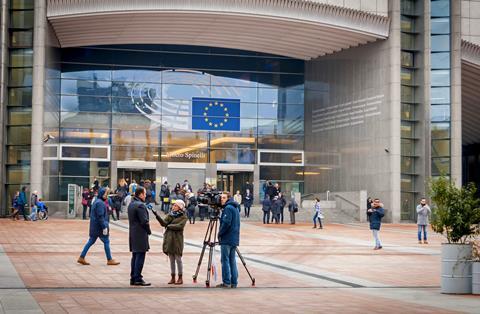Public service news is facing increasing pressures from politicians to declining audiences and attacks on impartiality. But is it all doom and gloom? – Raymond Snoddy investigates.

To the casual eye the future of public service broadcasting news looks bleak. A linear service that has been at the heart of the television schedule for decades is simultaneously facing so many different challenges that it could be seen to amount to the perfect storm.
Audiences are declining and ageing. The young are departing in the direction of their various devices and social media outlets, consuming news, if at all, in the form of mobile headlines rather than built bulletins and hoovering up fake and unverified news along with all the rest.
- Read more: Tony Hall: EBU can tackle fake news
To add to the toxic mix for news the rise of endless sources of entertainment from the large international streaming organisations have lured eyeballs away and put pressure on available time. Some say they have simply abandoned news because they find it all too depressing.
To add to these problems, the rise of centre-right governments and outright populist movements across Europe, have tended to question the legitimacy of traditional news values which are denounced as part of a liberal establishment “conspiracy.”
In some countries such governments have slashed funding for public broadcasters saying licence fees are too high and that they represent too great an interference in the operations of the free market.
Divisive issues such as mass migration have raised serious questions about the duties and responsibilities of public service news and how the traditional mantra of Europe’s public service broadcasters – impartiality - should now be interpreted.
One of the most bitter disputes has been over Brexit, which has split UK society down the middle and exposed the BBC’s version of due impartiality to criticism not just from the political left and the right but, maybe for the first time, also from the centre.
“It would be naïve to say there weren’t a lot of challenges out there, but we shouldn’t be sounding the death knell of public service media news broadcasting” Noel Curran, EBU
It would be easy to be depressed by such a catalogue of gloom – but it would also be misleading, certainly to lifelong public service broadcaster and director-general of the European Broadcasting Union, Noel Curran.
“It would be naïve for anyone to say there weren’t a lot of challenges out there, more than just technology, it’s the interests of younger audiences particularly, but I still think we shouldn’t be sounding the death knell of public service media news broadcasting,” Curran argues.
“We have been around a long time. We have faced challenges before but just look at our trust levels. They are incredibly strong and that is our core currency,” said the former investigative reporter and director-general of Ireland public broadcaster RTE.
Trust and tech
The response involves the importance of trust and the need for broadcasters to keep up with rapidly changing technology through innovation.
The public broadcasters of Europe have used technology to make news available across multiple platforms, including mobile and Facebook.
They have changed editorial priorities to choose topics of interest to younger people and delivered them online, ensuring that they are not just bits lifted from the linear schedule but instead putting together shorter, specially produced material.
The PSBs are also using more user-generated material but have set up a system to verify its authenticity.
There are even plans at the EBU to underline the trust in its journalism by targeting important political events and pooling fact-checking resources across the organisation to separate the authentic from the spurious in the news.
“The difficulty is deciding where the actual division lies as new parties emerge and political alliances shift and change sometimes at bewildering speed.” Ivor Gaber, Sussex University
Some media academics, however, emphasise the enormity of the challenge public broadcasters face in having to cope with a breakdown and fragmentation of the old political order.
Until recently the essential political divide in Europe was between parties of the centre left and the centre right. In such a world, Ivor Gaber, professor of journalism at Sussex University, believes usual practices of balance and impartiality could be achieved.
“Not only is the division increasingly no longer between generally identifiable left and right parties, but the difficulty is deciding where the actual division lies as new parties emerge and have little or no ideology, and political alliances shift and change, sometimes at bewildering speed,” says Gaber, a former BBC television journalist.
- Read more: CBC and BBC ink co-production deal
Gaber also notes that in the past public service news broadcasters were dealing with roughly similar levels of veracity – spinning the stories maybe but not faking them.
Now broadcasters, Geber notes, have to cope with political parties running emotive and misleading campaigns - in the UK Brexit case - campaigns led by people prepared to use questionable data gathered by illegal means.

Despite the difficulties of defining what impartiality means in the current political climate, Patrick Barwise, emeritus professor of marketing and advertising at the London Business School, insists the public still value impartiality and believes that overall the public service broadcasters, including advertising funded PSBs as delivering it.
“The public does trust the PSBs, particularly the BBC and the media outlet trusted least is The Sun newspaper,” say Barwise who is writing a book on the BBC with author and broadcaster Peter York.
Attacks left and right
The Sun recently called for the abolition of the BBC licence fee and its replacement by a Netflix-style subscription.
Attacks on the BBC for being too right wing or left wing is nothing new, although Barwise research finds that disproportionately and most stridently complaints come from the right.
“With Brexit the BBC is pretty much on a hiding to nothing, because it is so divisive,” Barwise comments.
“But I think where they have gone wrong, and to a lesser extent as well on climate change, by what is called false balance – where you give equal airtime when one or possible two are talking out of their backsides,” Barwise adds.
The funding of public service broadcasters, and therefore the news, is also a widespread problem.
The UK government decided to make the BBC take over the funding of free licence fees for the over 75’s and the BBC is facing considerable unpopularity from making all, but the poorest pensioners pay the licence fee from next year. The alternative was a £745 million a year hit, and rising in an ageing population, something that would have led to major service closures.
The case of DK, the Danish public service broadcaster, is just as extreme. A 20% budget cut imposed by the Danish government led to the closure of three of the organisation’s six television stations plus three radio stations.
Apart from finance, public attitudes to news presents a growing problem.
The latest report on the news business from the Reuters Institute for the Study of Journalism, based on data in 40 countries across six continents, found an increasing number of people saying they actively avoided the news – no less than 32%.
In the UK avoidance is up 11% driven by “boredom, anger or sadness over Brexit. People say they avoid the news because it has a negative effect on their mood or because they feel powerless to change events,” the Reuters Institute says.

Leaving aside all such problems the EBU is pushing ahead with a number of initiatives to boost journalism – including a journalism trust initiative with Reporters Without Frontiers.
Already 33 investigative journalists have signed up across Europe to work together on individual stories.
Curran believes the tide may have turned on fake or unsubstantiated news. Multiple surveys show high levels of trust in public service broadcasters, while trust levels for social media are collapsing.
This could be a key advantage combined with emphasising that journalism and news is one of the core outputs and values of public service broadcasting and an important way of connecting with audiences.
Thirty years ago, Noel Curran wrote a thesis on broadcasting policy and at the time could hardly find an academic who thought that public service broadcasting would even be around in 30 years time.
Now he smiles and says: “Yes there are challenges but look at our presence around Europe still – it’s just a matter of adapting, changing and realising that younger audiences are a big challenge for us and going after that,” says the director-general of the EBU.
Interested in broadcasters’ future strategies? Find out more at Global Strategy Gamechangers: Can public broadcasters stay relevant? keynote at IBC2019
- IBC2019 takes place 13-17 September at the Rai, Amsterdam
























No comments yet